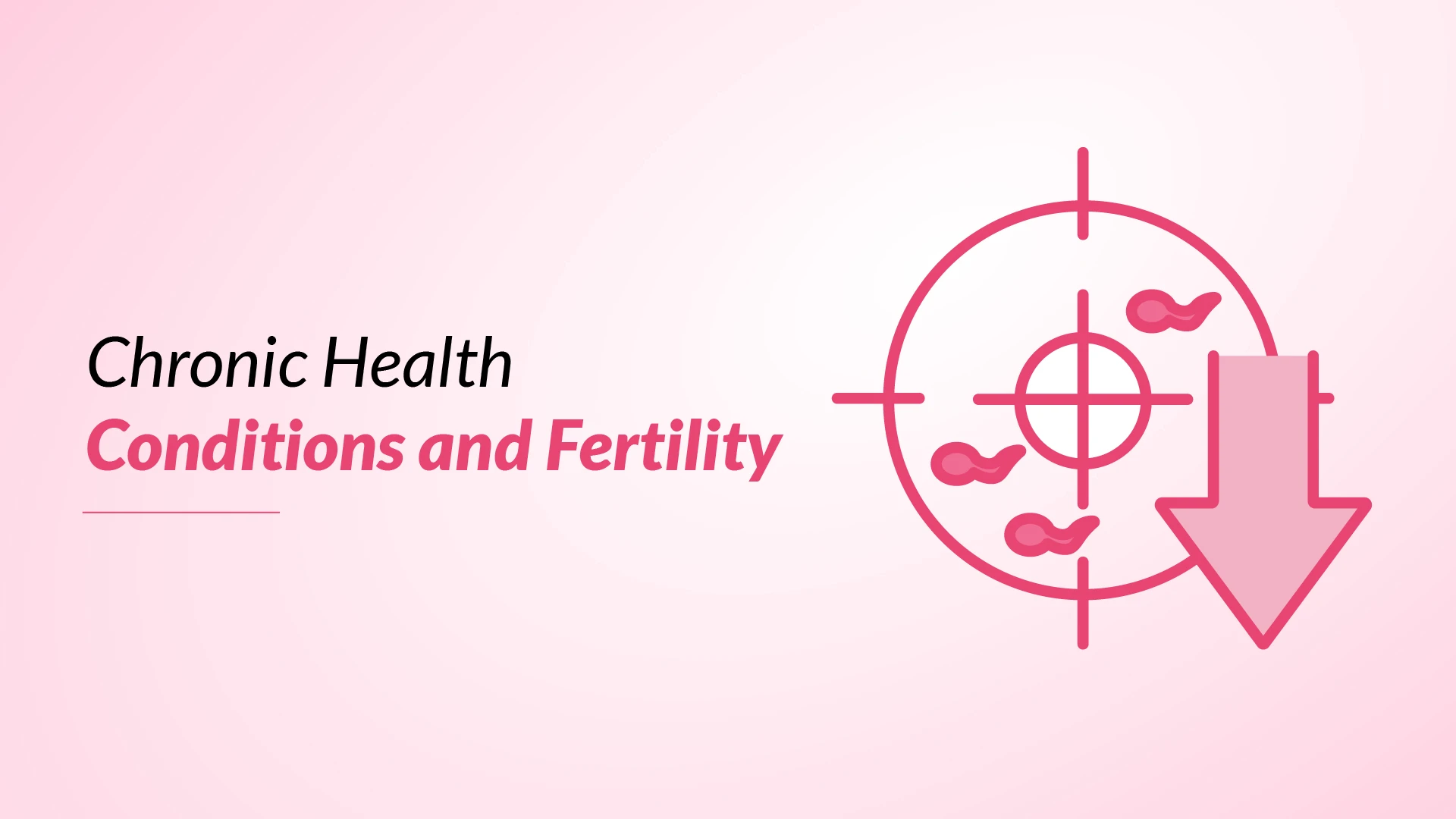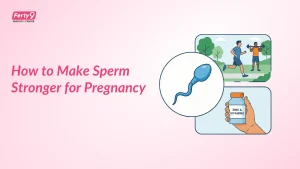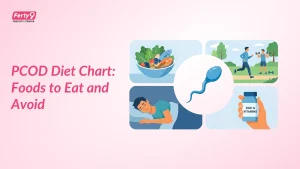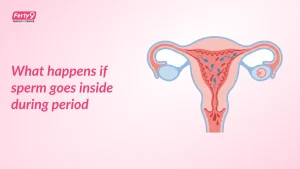Fertility is an important and complex aspect of human health that is influenced by a variety of factors. While age, genetics, and lifestyle play significant roles, chronic health conditions also have a profound effect on one’s ability to conceive. Whether you’re actively trying to have a baby or planning to have one in the future, it’s essential to understand how certain long-term health conditions can affect fertility in both men and women.
Here, we’ll discuss some common chronic conditions and their influence on reproductive health, as well as how proper management can help improve the chances of conception.
Also read: How Fertility Drugs Work: Boosting Your Chances of Conception
Impact of Chronic Conditions on Female Fertility
Chronic conditions like endometriosis, pelvic inflammatory disease (PID), hypertension, and anemia can seriously affect female fertility. For instance, endometriosis and infertility are closely linked because the condition can lead to blocked fallopian tubes or scar tissue around the reproductive organs, making it hard for an egg to reach the sperm. Similarly, pelvic inflammatory disease can cause infertility by damaging the reproductive organs through infection.
Women who have persistent hypertension are more likely to experience pregnancy problems. High blood pressure can restrict or limit the blood flow to the uterus, thus affecting embryo implantation or leading to miscarriage. Managing chronic hypertension pregnancy challenges requires proper medication and lifestyle adjustments to improve the possibilities of a healthy conception and pregnancy.
Another factor that impacts female fertility is anemia. Women with iron deficiency anemia often experience irregular periods, and in severe cases, it can lead to infertility. Low levels of iron reduce the body’s ability to carry oxygen to reproductive organs, which can impact ovulation and overall fertility health. So, if you’re asking, “Does low iron cause infertility?” — the answer is, yes, it can.
Moreover, genetic conditions like Kartagener syndrome, which affects the structure of the fallopian tubes, can also lead to infertility in women. Genetic disorders that cause female infertility need to be identified early to explore fertility options that work around the problem.
Impact of Chronic Conditions on Male Fertility
Men are not exempt from fertility issues caused by chronic health conditions. Conditions like hypogonadism—which leads to reduced testosterone levels—can directly impact sperm production and result in infertility. Hypogonadism and infertility are often seen together because testosterone plays an important role in sperm development.
Chronic health conditions like hypertension also affect male fertility. Studies have shown a link between hypertension and male fertility, as high blood pressure can reduce sperm quality and mobility.
Additionally, anemia and infertility are also connected in men, as low iron levels can impact overall health and reduce sperm quality. Both men and women with iron-deficiency anemia should seek treatment not only to improve fertility but also to boost overall energy levels and well-being.
Medications and Their Role in Fertility Challenges
Many chronic health conditions require long-term medication, which can further complicate fertility. Some medications interfere with hormone levels, while others may directly impact reproductive organs. Here are a few examples:
- Antidepressants: These medications can reduce libido and interfere with the ability to conceive, especially if used over a long period.
- Anti-hypertensives: Medicines for high blood pressure can lead to erectile dysfunction in men and affect blood flow in women.
- Steroids: Long-term use of steroids can reduce sperm production in men and affect menstrual cycles in women.
If you or your partner are on long-term medication for a chronic condition, it’s important to discuss fertility plans with your doctor. Adjusting the dose or switching to a different medicine can sometimes make a big difference.
Also read: Managing Diabetes to Improve Fertility: Tips and Strategies
Strategies to Manage Fertility While Dealing with Chronic Health Issues
Living with a chronic illness doesn’t mean giving up on your dream of having a family. With careful planning and the right medical support, you can optimize your chances of conceiving. Here are some strategies:
- Early Fertility Check-ups: Regular fertility checks for both men and women help identify potential issues early. Tests like the fertility hormone test and fertility blood tests can assess egg and sperm quality, while egg count tests for women provide valuable insight into ovarian reserves.
- Lifestyle Modifications: Managing your chronic condition through diet, exercise, and lifestyle changes can improve your fertility health. For example, controlling chronic high blood pressure through dietary adjustments and exercise can improve blood flow to the reproductive organs.
- Stress Management: Chronic conditions often come with high stress levels, which can impact fertility. Practicing mindfulness, yoga, or other stress-relief techniques can positively influence your reproductive health.
- Consulting Specialists: For conditions like hypogonadism, seeking specialist care is crucial. An endocrinologist can recommend the right treatment plan to manage the condition without compromising fertility.
- Monitoring Medications: Work closely with your healthcare provider to adjust medications if necessary. This is especially important for women managing chronic hypertension in pregnancy. With the right approach, medication and fertility can coexist.
Also read: Trying To Conceive Tips from Experts
Fertility Treatment Options for Patients with Chronic Conditions
If natural conception proves difficult, several fertility treatment options are available. Couples dealing with chronic health conditions can explore these treatments based on their individual needs:
- Intrauterine Insemination (IUI): Ideal for men with low sperm count or motility due to chronic conditions. Sperm is placed directly in the uterus to improve fertilization chances.
- In Vitro Fertilization (IVF): Recommended for women with blocked fallopian tubes, such as from endometriosis or pelvic inflammatory disease. Fertilization occurs in the lab, bypassing natural processes.
- Intracytoplasmic Sperm Injection (ICSI): Useful for men with severe sperm issues. A single sperm is directly injected into the egg to ensure fertilization.
- Physiological Intracytoplasmic Sperm Injection (PICSI): Selects the healthiest sperm for injection, improving fertilization outcomes.
- Fertility Preservation: Egg freezing or sperm banking for those delaying pregnancy, especially if a chronic condition may worsen.
- Genetic Programme: For patients with genetic conditions like Kartagener syndrome, embryos are screened for abnormalities before implantation.
- Blastocyst Culture: Embryos are grown longer in the lab, allowing selection of the healthiest for transfer and increasing implantation success.
These treatments offer hope and solutions for those struggling with fertility challenges due to chronic health issues.
Conclusion
Chronic health conditions don’t have to be a barrier to parenthood. By understanding the impact of conditions like endometriosis, anemia, and chronic hypertension, in pregnancy and seeking early treatment, you can improve your chances of having a family. Regular health screenings, lifestyle changes, and the right fertility treatments can make all the difference.
If you’re concerned about how your chronic condition may affect your fertility, consult with experts like those at Ferty9 Fertility Center. Our experienced team can guide you through the process, offering hope and solutions tailored to your specific needs.




























